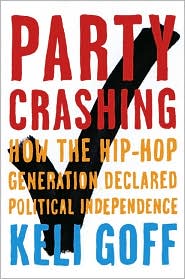
In her lively and engaging book Party Crashing: How the Hip-Hop Generation Declared Political Independence, Keli Goff asserts that America’s political parties ignore the new reality of the post-civil rights generation black American voter at their peril. Citing economic and social influences that have shifted dramatically in the last 40 years or so, Party Crashing explores how a once-unified voting bloc of African Americans that may have been loyal Democrats has evolved into today’s generation of young African American adults who refuse to allow either party to take their votes for granted. While Democrats may assume they’ve got the African American vote locked up, Republicans assume the same, and the result is a population that remains disenfranchised.
Surprised by the results of a 2001 Joint Center for Political and Economic Studies poll, which showed 35 percent of African Americans aged 18 to 35 identified themselves as politically independent and 62 percent self-identified as Democrats, Goff worked with the Suffolk University Political Research Center to conduct another study in 2007. Curious as to whether the strong showing of independents in the original survey was a fluke or a reflection of real change within the black young adult community, the new poll queried 400 randomly selected African Americans, aged 18 to 45 (expanding the upper limit to include those who would have been eligible for participation in the first study). Among those asked, 35 percent of respondents 18 to 24-years-old self-identified as independent voters, and 41 percent of respondents self-identified as registered Democrats, but would not call themselves “committed Democrats.”
Intrigued by these results, Goff took her research directly to young African American adults for their thoughts on the relationship between skin color and voting preferences, and how and why it may have changed since their parents and grandparents’ generation.
Chapter by chapter, Goff examines the role of churches in African Americans’ historically strong ties to the Democratic party; the concept of black leadership in America and what that means, both within and outside the African American community; and Democratic and Republican political missteps in national, state, and local elections past. Goff complements her research study with a cultural analysis of Chris Rock’s stand-up comedy and Bill Cosby’s The Cosby Show, conversations with post-civil rights generation African American voters, and additional interviews with General Colin Powell, hip-hop mogul Russell Simmons, Bakari Kitwana (author of The Hip Hop Generation), Republican and Democratic Party officials, and more. The result is engaging, entertaining, and eye-opening.
Throughout the book, Goff returns time and again to the argument that the social and economic influences that supported young black Americans’ parents’ and grandparents’ allegiance to the Democratic Party have evolved. This generation of African Americans, born within the last 40 years, does not have the same first-hand experience with the civil rights era that their parents and grandparents had. There has been, in general, a generational shift that reflects increased tolerance of social issues, such as gay marriage. Also, the growing number of African American families in the middle and upper classes of American society has influenced their voting interests to weigh economic factors like tax policies more than ever before.
The end result is the fragmenting of a once-cohesive voting bloc. Independent-minded young African American adults are more likely to carefully question what a candidate and his or her policies can do for them instead of voting along party lines. Goff’s book demonstrates clearly that young African American voters firmly believe that candidates and parties must actively court their vote, and not just in the weeks before an election.
As with most politically oriented books, especially those published during an election cycle, the time is of the essence, and that’s true with Party Crashing. A few of the details Goff explores in her book have been resolved. For example, the contest between Illinois Sen. Barack Obama and New York Sen. Hillary Rodham Clinton has been resolved, with Sen. Obama the presumptive Democratic nominee. However, the big picture — the fact that the votes of young black Americans, either as a group or individually, cannot be taken for granted by any candidate of either party — is a valid one, worthy of discussion for the 2008 election and beyond.
- Follow us on Twitter: @inthefray
- Comment on stories or like us on Facebook
- Subscribe to our free email newsletter
- Send us your writing, photography, or artwork
- Republish our Creative Commons-licensed content

